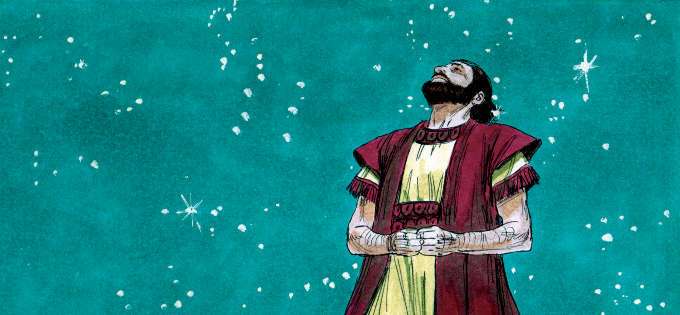אתה הוא א’להינו וא’להי אבותינו, מלכנו מלך אבותינו, גואלנו גואל אבותינו
For You are our God, and God of our ancestors – our ruler, and ruler of our ancestors – our redeemer, and redeemer of our ancestors.
Deep prayer can often feel like a sacred solitary experience, a lone person confronting God. We properly treasure those aspects of prayer as hitbodedut, focused solitude, when the world vanishes and we can whisper our secrets to God.
Yet we also find rich connection in our presence among the group – whether literally in the minyan, the quorum of your fellow daveners sharing the room with you whose voices you can hear in prayer, or the metaphoric community of Israel, present beside you across space and time.
These words in the blessing that follows the Shema remind me of the spiritual possibilities deriving from being part of the congregation of Israel.
First: I know I do not stand alone. Beside me as I daven, I can sense the presence of millions of Jews over hundreds of years who discovered spiritual heights and depths in these words. I am blessed to have זכות אבות/zekhut avot, the merit of my ancestors encouraging me. God need not see me as one poor mortal, but as a child of Abraham and Sarah, a student of Moses, a member of Miriam’s choir, and so on.
Next, I reflect on the lengthy and continuing conversation of Am Israel, the Jewish people, about our religious images. Probably the peshat or semantic meaning of this phrase affirms that our religious commitments endure unchanged: our God, our ruler, our redeemer is the very same one that our ancestors worshipped.
Problem is: it ain’t necessarily so. Actually our religious conceptions have grown and changed so much through history. What do א’להים/Elohim/God, or מלך/melekh/ruler or גואל/go’el/redeemer mean to me? Surely something very different from what those images conjured to my ancestors who lived so many centuries ago. And yet when I daven this phrase I affirm that Judaism remains one evolving spiritual inheritance, interconnected through lines of descent and influence, linking all the manifestations of Jewish religion to all the others. My God today, and yours, however traditional or heretical or metaphorical they may be, is linked to the theology that inspired our many ancestors. Redemption today may mean something quite unlike the expressions that moved our biblical or rabbinic ancestors. Yet davening this passage enables us to say that God is One through the profuse and varied images Jews used across time. Strange as it may seem, our “ruler” is the ruler of our ancestors.
Finally, for me, it stirs me to a humble reflection on being a descendant. We modern folks are so sophisticated in many ways. Today’s eighth graders understand biology and chemistry and physics more clearly than Aristotle did. We are educated to think critically about religion and culture; we know the difference between myth and history; we recognize the difference between superstition, wishful thinking and a reality external to ourselves. It is hard not to look down on the past, at least a little, as more primitive than our own time. Davening this phrase pierces some of my self-satisfaction and drives me to a grateful awareness of what I have inherited from ancestors.
Who were they? I know a bare few facts about them and have some general knowledge about places and times they lived. When I exhaust knowledge, imagination takes over and I invent stories. Standing beside me I think of poor immigrants, only 125 years ago, leaving home and family in Eastern Europe for North America, learning languages and making livings. I try to imagine back further in time to small artisans or merchants in early modern market towns. What did they experience on Shabbat? At Pesach, Sukkot or Rosh HaShanah? Page further back into the richness or struggles of medieval Jewish life – for me it’s in Europe, for others it could be in Iraq or Tunisia – what did they eat or wear, how did they make friends or contend with enemies, what made them want to daven or say a grateful blessing?
Davening these phrases in my 21st century liberal American synagogue – I invite my ancestors to stand beside me with their own hopes, dreams, fears and faith. For You are our God, and God of our ancestors – our ruler, and ruler of our ancestors – our redeemer, and redeemer of our ancestors.





